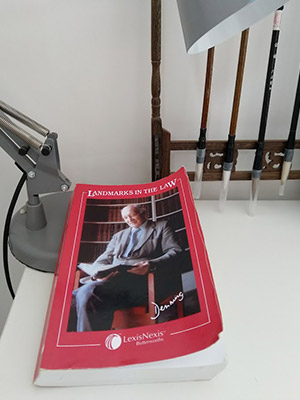Denning in Landmarks in the Law presents a compelling compilation of cases that have defined the legal system as it is today. His structural style of short paragraphs, all with their own headings, provides an easy-to-read guide of some of history’s most riveting cases, compared to a more descriptive prose style.
Whilst I have undergone 1 year of my legal studies, I am still relatively new to many legal concepts and terminology, however Denning’s idiosyncratic yet witty language enabled me to understand with ease. His chronological approach enables readers to be guided through legal history, beginning with foundations in treason and use of torture, to dealing with the freedom of individuals and assembly, and ultimately culminating in discussion of freedom of press and Denning’s most important case, the Profumo Inquiry. Whilst the text is slightly outdated, and some views may be deemed controversial in today’s society, Denning’s journey through Landmarks in the Law, allows one to see modern technology and secular views beginning to influence the legal world, and provides an insight to our ever-developing world.
Almost all the cases discussed involved political aspects, and I admire Denning for not solely focusing on legal concepts, but instead engaging with context and the outcome’s consequences on individuals and history overall.
One example that particularly resonated with me was with regards to the six Tolpuddle men, where the judge’s conduct was disgraceful due to his aggressive and belligerent attempts to force the prosecution to give evidence against the accused. This case revealed how different an outcome would be compared to today, where our legal system has appeals, evidently demonstrating the progression in England and Wales; albeit far too late for many defendants.
Overall, I would highly recommend this text for anybody with an interest in our legal system, regardless if they have a legal education, as Denning’s language provides for an approachable commentary.





